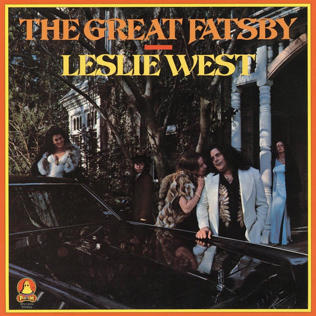
John Symon Asher Bruce was a Scottish musician. He gained popularity as the primary lead vocalist and bassist of rock band Cream. After the group disbanded in 1968, he pursued a solo career and also played with several bands.

Mountain was an American hard rock band formed in Long Island, New York, in 1969. Originally consisting of vocalist-guitarist Leslie West, bassist-vocalist Felix Pappalardi, keyboardist Steve Knight, and drummer N. D. Smart, the group disbanded in 1972, but reunited on several occasions prior to West's death in 2020. They are best-known for their 1970 smash hit song "Mississippi Queen", which remains a staple of classic rock radio, as well as the heavily sampled song "Long Red", and their performance at Woodstock Festival in 1969. Mountain is one of many bands commonly credited with influencing the development of heavy metal music during the 1970s. The group's musical style primarily consisted of hard rock, blues rock, and heavy metal.

West, Bruce and Laing were a Scottish–American-Canadian blues rock power trio super-group formed in 1972 by Leslie West, Jack Bruce, and Corky Laing. The band released two studio albums, Why Dontcha (1972) and Whatever Turns You On (1973), during their active tenure. Their disbanding was officially announced in early 1974 prior to the release of their third and last album, Live 'n' Kickin'.

Leslie Abel West was an American guitarist, singer and songwriter. He was the co-founder, guitarist and co-lead vocalist of the rock band Mountain. West was named the 245th greatest guitarist of all time by Rolling Stone in 2023.

Laurence Gordon "Corky" Laing is a Canadian rock drummer, best known as a longtime member of the pioneering American hard rock band Mountain. He and guitarist/vocalist Leslie West were the only members to appear on every album.
Eric Clapton and the Powerhouse was a British blues rock studio group formed in 1966. They recorded three songs, which were released on the Elektra Records compilation What's Shakin' in 1966. A possible fourth song remained unreleased.

Climbing! is the debut studio album by American hard rock band Mountain. It was released on March 7, 1970, by Windfall Records.

Why Dontcha is the first studio album by power trio West, Bruce and Laing.

Whatever Turns You On is the second and last studio album by blues rock power trio/supergroup West, Bruce and Laing.

Nantucket Sleighride is the second studio album by American hard rock band Mountain, released in January 1971 by Windfall Records in the US and by Island in the UK. It reached number 16 on the Billboard Hot 200 Album Chart in 1971.

Flowers of Evil is the third studio album and first live album by American hard rock band Mountain. The title track concerns drug abuse in Vietnam. The first side of the album includes new studio material, while the second consists of live material recorded on 27 June 1971 at the Fillmore East in New York City. It was released in November 1971 by Windfall.

Live: The Road Goes Ever On is the second live album by American hard rock band Mountain, released on 24 April 1972 by Windfall Records. It contains four songs recorded at three shows in August 1969, December 1971, and January 1972. The album was produced by the band's bassist and second vocalist Felix Pappalardi, while the artwork was created by his wife and collaborator Gail Collins. The Road Goes Ever On takes its name from J. R. R. Tolkien's 1937 novel The Hobbit.

Twin Peaks is the third live album by American hard rock band Mountain, released in February 1974 by Columbia and Windfall Records. It contains recordings from the band's performance at Koseinenkin Hall in Osaka, Japan on August 30, 1973. The album was produced by the band's bassist and second vocalist Felix Pappalardi, while the artwork was created by his wife and collaborator Gail Collins. It was Mountain's first release since returning after a year-long hiatus.

The Best of Mountain is the only compilation album by American hard rock band Mountain. It consists of material recorded throughout 1970-1971, culled from their first three LPs. On 15 April 2003, the album was remastered and reissued in an expanded edition with new liner notes and four bonus tracks, two of which are taken from Leslie West's first solo album, 1969's Felix Pappalardi-produced Mountain, the project which eventually led to the formation of the band.

Go for Your Life is the fifth studio album by American hard rock band Mountain, released on March 9, 1985. It was their first studio album since 1974's Avalanche.

Avalanche is the fourth studio album by American hard rock band Mountain, released in July 1974. It featured the return of drummer Corky Laing and was the band's only recording with second guitarist David Perry. It was their final album of the 1970s and the last to feature bassist/producer Felix Pappalardi.

Mystic Fire is the seventh studio album by American hard rock band Mountain, released in 2002. It is their final album of original material, as their following album, Masters of War, would consist solely of covers.

Theme is a 1988 album by Leslie West. It features Jack Bruce and Joe Franco. It takes its title from the track "Theme for an Imaginary Western", first recorded by Jack Bruce on Songs for a Tailor and subsequently featured on Mountain's debut album Climbing!.

The Great Fatsby is the second album by American rock guitarist, singer and songwriter Leslie West. It was released on Bud Prager's Phantom Records in March 1975 and distributed by RCA Records. The album features Mick Jagger on rhythm guitar. The album features four original tracks alongside West's interpretation of six other songs: covers of tracks by Paul Kelly, the Animals, the Rolling Stones, Sharks, Tim Hardin and Free.


















